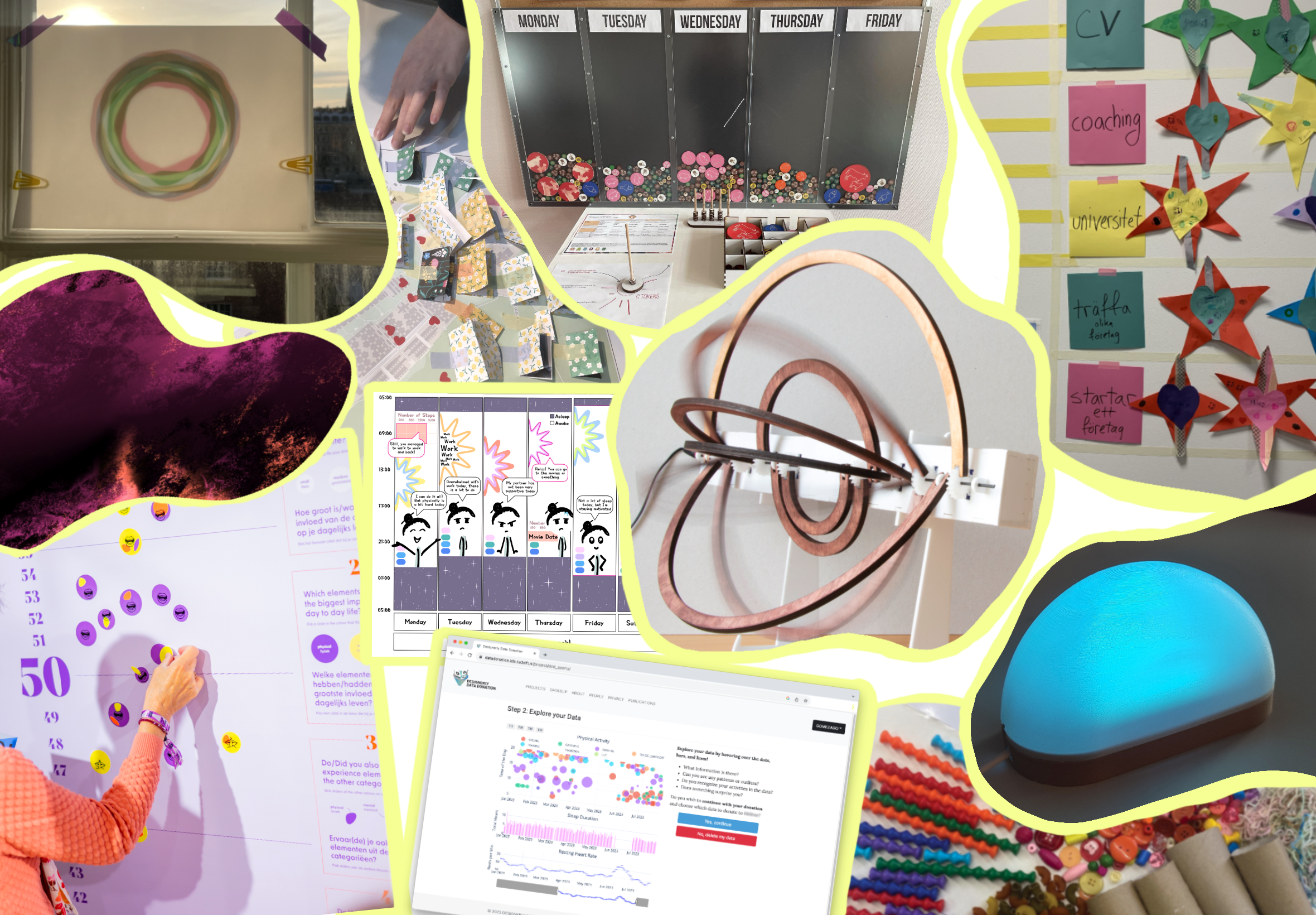Workshop DIS 2025
Bring Your Own Biodata (BYOB):
Feminist, Corporeal and Collective Approaches to Datafied Bodies
Funchal, Madeira - 6 July 2025

Description
Quantitative representations of the body have become increasingly commonplace, a requisite for many navigating complex health issues, yet also heavily scrutinized under feminist lenses for flattening embodied experiences and perpetuating norms.
How might designers and researchers navigate this tension, engaging with quantified (bio)data in corporeal, sensory, collective, and anti-solutionist ways?
This 1-day workshop will bring together HCI researchers, practitioners, and designers to solidify the role of design in shaping how we interact with, know, grasp, and enjoy our data, while staying true to critical feminist values. Attendees will be invited to Bring Your/their own (Bio)Datasets (BYOB) as well as any tools or data physicalization crafting techniques they want to employ.
The intended outcome of this workshop is a plurality of datasets, data tools, and data representations that empower people to engage with their data in ways other than the ones afforded by screens and dashboards, emphasizing agency, embodiment, and community.
Schedule
Morning Session: Welcome and Introductions (09:30-12:30)
09:30-09:45 - Welcome and Goals
Arrival and introduction to the workshop’s objectives and schedule.
09:45-10:15 - Collective Consent Form
We will collectively identify values we want to follow for the rest of the day and create a supportive environment where participants can feel comfortable and safe.
10:15-12:00 - Participant Introductions and Biodata Sharing
Who we are and what did we bring today. Sharing of tools and mediums we are familiar with and have used in the past with our own data. We will discuss and critically reflect on biodata assumptions, exclusions, and possibilities. For instance, what can get included or excluded if we make a sharable representation of our data.
12:00-12:30 - Short Interoception Activity
Short body mapping activity.
Lunch Break (12:30-13:30)
Afternoon Session: Crafting Representations and Discussion (13:30-17:00)
13:30-15:00 - Extended Hands-on Making
Most of the afternoon will be dedicated to hands-on engagement with biodata, creating personal or collective representations. For example, initial prompts but not limited to "Make a tangible-visual representation of your data", "Make a `sharable' representation of your data, what do you want to include/exclude?'', or "Incorporate your biodata with other data (such as weather patterns, your preferred streaming service's watch data, or your GPS data) in a tangible-visual representation''.
15:00-15:45 - Showcase and Discussion
Presentation of people's work and discuss key insights. How can we engage with biodata in ways that highlight feminist, somatic, and emotional experiences, ethical considerations of working with biodata, data privacy, and collective sense-making? How can we create feminist spaces to work with biodata?
15:45-16:30 - Data Performance
Laura Forlano will lead an activity around data performance.
16:30-17:00 - Reflection and Next Steps
Identifying opportunities for further engagement and collaboration.
Organizers
Beatrice Vincenzi (she/her) is an Assistant Professor in the HCI Research Centre at Birmingham City University (UK). Her research focuses on inclusivity, accessibility, and designing technology with people with disabilities. She draws from critical disability studies, feminist theories, and her lived experience as a person with a chronic illness to re-think the role of technology in shaping social relationships, interactions, access, and inclusion. She employs first-person, research-through-design, and participatory approaches (e.g., co-design, soma design, interviews, and (auto)ethnographic), often combined with prototyping.
Nadia Campo Woytuk (she/they) is a PhD student in Interaction Design at KTH Royal Institute of Technology in Stockholm, Sweden, exploring critical feminist design of technologies for the intimate body and the social and environmental ecologies it entangles. She uses Research through Design methods, including making with textiles and biomaterials, as well as participatory and speculative approaches. Nadia has expertise in organizing workshops, especially on intimate and sensitive topics. Previously, Nadia has co-organized workshops at C&C'22, CHI'23, TEI'24, and DIS'24.
Alejandra Gómez Ortega (she/her) is a Digital Futures Postdoctoral Fellow at Stockholm University, Sweden. Her research applies critical and feminist perspectives to investigate how we interact with and encounter our data and their algorithmic derivatives through design. Alejandra has experience co-organizing creative sessions, workshops, and Special-Interest Groups on sensitive and intimate topics and data as a design material.
Kim Sauvé (she/her) is a Lecturer (Assistant Professor) at the University of the West of England (UWE) Bristol, United Kingdom. Her research blends empirical studies with explorative design practice to investigate how physical representations of data can enhance engagement, decision-making, and behavior change. She focuses on creating interactive systems that make complex data more accessible and meaningful through tangible interfaces (such as LOOP). She has co-organized multiple workshops on data physicalization, exploring its applications in various domains promoting sustainable methods and toolkits, and addressing contemporary challenges in the field.
Laura Forlano (she/her), a Fulbright award-winning and National Science Foundation funded scholar, is a disabled writer, social scientist and design researcher. She is Professor in the College of Arts, Media, and Design at Northeastern University. She is the author of Cyborg with Danya Glabau and an editor of three books: Bauhaus Futures (MIT Press 2019), digitalSTS (Princeton University Press 2019) and From Social Butterfly to Engaged Citizen (MIT Press 2011). She received her Ph.D. in communications from Columbia University.
Derya Akbaba (she/her) is a PhD student in Data Visualization at Linköping University in Norrköping, Sweden, whose work brings feminist epistemologies and methods to visualization research. Through this feminist lens, she explores overlooked, ignored, or unquestioned assumptions within information visualization. Her current research has focused on bringing critical data studies practices to community spaces through data crafting and physicalization workshops.
Edda Forero (she/her) is a researcher at Fundación Karisma (Digital Rights NGO) and cultural anthropologist with a background in collective and digital rights research and in structuring open data information systems. She has experience in pedagogical strategies to generate links between information, data, and territory through data literacy workshops.
Samuel Thulin (he/him) is an artist and researcher interested in the specificities of spaces and places, and in the movements and resonances of bodies, data, and sounds. Through his artworks and publications he has explored: locative media and contested senses of place; cartography and auditory culture; self-tracking, chronic illness, and datafication; and creative and emergent research methodologies. Working with his own diabetic data, he has created sonic, visual, and vibrotactile data artwork and has invited other diabetics to experiment with diabetic data art. Based in Tiohtià:ke/Montreal, Thulin is a Research Associate and Administrative Coordinator at Aging + Communication + Technologies (ACT) Lab at Concordia University.
Pedro Sanches (he/him) is an Associate Professor at the Department of Informatics, at Umeå University. His research draws on feminist epistemologies to design biodata-driven and AI-based technologies for health and wellbeing, as well as performing arts. He applies speculative and somaesthetic design tactics to consider situated lived experiences when crafting with data as a material.
Kit Kuksenok (they/them) is a multidisciplinary artist and coder based in Berlin. Through research and teaching collaborations, their mission is to expand the collective imagination of technology's role in how we understand and imagine the human body. Their work has explored both critical and curious perspectives on the sociotechnical aspects of body knowledge, particularly through expressive and abstract representations of body data.
